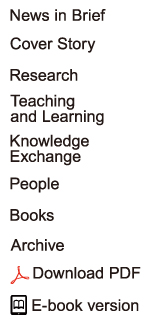Extraction from pamphlets in 19th-century China illustrating children’s kidney being removed.
(Photo courtesy of Princeton Library)
Redefining Multiculturalism
In our global society, research from one part of the world can make a difference in another part, which is one of the reasons HKU prides itself on its diverse scholars making contributions to knowledge the world over. A study of American curriculum might seem unimportant to Hong Kong life. However Dr Liz Jackson’s book, Muslims and Islam in US Education: Reconsidering Multiculturalism, provides a counter case.
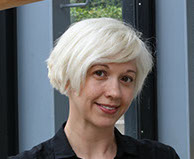
![]() I was surprised to find that when and if Islam was discussed, the emphasis always seemed to be on Islam and terrorism.
I was surprised to find that when and if Islam was discussed, the emphasis always seemed to be on Islam and terrorism.![]()
Dr Liz Jackson
Although focussed on American education, Dr Jackson’s book provides lessons that can be extended to Hong Kong: these relate to diversity in society, competing demands for national stability and democracy, and how to understand the varied experiences of Muslims the world over. This year the book has been selected for the PESA (Philosophy of Education Society of Australia) Book Award and the HKU Research Output Prize for Education.
The book focusses on the case of Islam in US education over the last 20 years with implications for curricula, religious education and multicultural education today. It explores the complex relationships between religious education in the US, the attitudes of teachers and society toward Islam, and multiculturalism as a framework for meeting the needs of minority group students. Dr Jackson looks closely at multiculturalism as a concept and suggests that it should be rethought with the aim of developing a more democratic, inclusive and informed society.
Prompted by her surprise at the impact of Middle East politics on US textbooks in the 1980s and 1990s, Dr Jackson first explored Islam in American education for her thesis in 2008. She could have no idea that even more interesting changes to texts – and more fascinating debates about Islam in society and education – would take place toward the end of the 2000s, and into the 2010s.
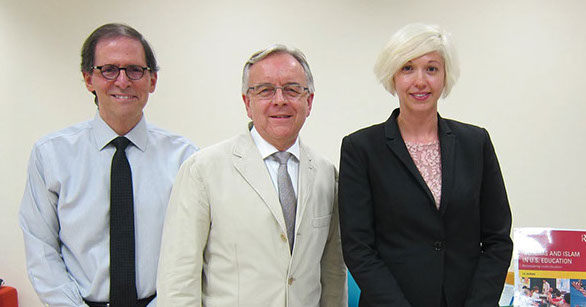
From left: Professor Gerard Postiglione, Associate Dean (Research), Faculty of Education; Dean of Education Professor Steve Andrews; and Dr Liz Jackson at the book launch on September 19, 2014.
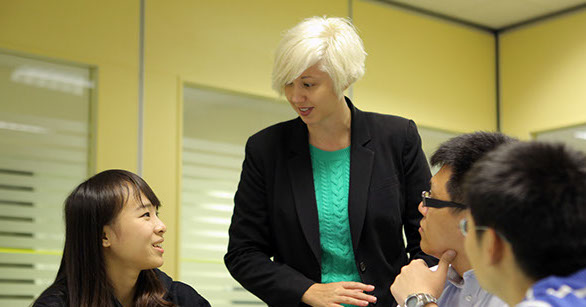
Dr Liz Jackson (second from left) having a discussion with students.
![]() Occupy Central gave rise to new questions about identity – who is a Hongkonger and what is multiculturalism?
Occupy Central gave rise to new questions about identity – who is a Hongkonger and what is multiculturalism? ![]()
Dr Liz Jackson
Public ignorance
“In the US the place of religion in the public sphere has always been controversial. And there was a lot of public ignorance about Islam revealed after 9/11,” she said. Since then, there has been a growing acknowledgement that education about Islam is necessary but she notes that such efforts are often disparaged by local communities as somehow unpatriotic.
Dr Jackson admits that when she first came to HKU three years ago, she wondered how her research would be relevant or applicable to Hong Kong. It is both. In 2012 she was funded by the UGC (University Grants Committee) Early Career Scheme to examine the representation of ethnicity, religion and minorities in Liberal Studies curriculum.
“I was surprised to find that when and if Islam was discussed, the emphasis always seemed to be on Islam and terrorism. There is a conflict here – if a goal in Liberal Studies is to increase understanding of diverse viewpoints, such exclusively negative connotations do not address that aim. This focus raises questions about whether the curriculum is mirroring the values that we as a society want to promote.”
This became very pertinent in 2012 when the debate about national education was raging, as Dr Jackson observes that Liberal Studies aims to develop cultural alignment of students with China without regard to the belonging of ethnic minorities in society. “Occupy Central too, gave rise to new questions about identity – who is a Hongkonger and what is multiculturalism?” Liberal Studies was again under fire, and various political figures in Hong Kong sought out Dr Jackson’s advice regarding how to reform Liberal Studies to be inclusive, balanced and informative.
In both the book and this latest research, Dr Jackson argues that while challenging stereotypes perpetuated by the media and encouraging dialogue and understanding are essential, it is difficult without proper educational materials and instructors who can facilitate this learning. She calls for the creation of learning environments that facilitate critical media literacy and enhanced opportunities to practise democratic dialogue.
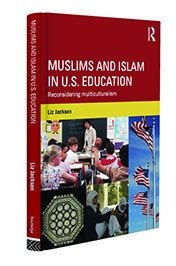
Muslims and Islam in US Education: Reconsidering Multiculturalism is published by Routledge.
Asked about the book’s implications for Hong Kong, Dr Jackson talks about changing awareness within the city. “I used to have to explain my specialist area – two years ago, people would ask me: ‘Why does Islam matter?’ or ‘Why would I want to know about Islam?’. Now they say: ‘Tell me what’s going on in Islam – I want to know.’” A few years ago she used to joke that her next book would be ‘Islam in Hong Kong’. Today this idea is taking shape.
Dr Jackson will be sharing her book in Europe over the next year, when she will be taking her sabbatical as a visiting scholar at the University of Glasgow. A review symposium of the book is forthcoming this fall with the journal Educational Philosophy and Theory.

Dr Liz Jackson regards the two significant social movements in Hong Kong – the debate about national education in 2012 and the Umbrella Movement in 2014 (shown above) – have given rise to new angles about identity and multiculturalism.
Back

